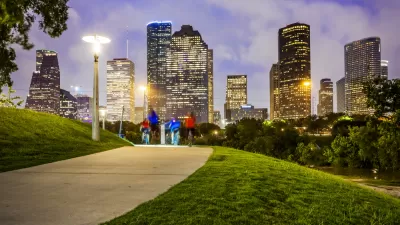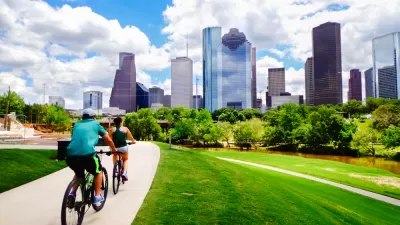The newly revealed Houston Bike Plan targets an estimated $300 million to $500 million in investments into the city's bike infrastructure.
Raj Mankad reports on bike news for bike planning out of Houston, Texas, where the city recently announced a draft of its first bike plan since 1993. The Houston Bike Plan, according to Mankad, plots the way toward a bike infrastructure network that appeals to a much broader cross section of the city's population.
The draft plan was recently released to the public and presented to the city's Planning Commission. Traffic Engineers, Morris Architects, and Asakura Robinson comprised the team behind the draft, with funding from the Houston Endowment funding a chunk of the $400,000 bill for the plan.
Mankad digs into the draft plan, breaking down the plan's focus on "high-comfort," low-stress routes. The article includes a lot of maps and plan details.
The news about Houston's ambitious bike plan has sparked a wide variety of media coverage in the past week. Here's a roundup of major media coverage:
- Dug Begley and Mike Morris provide an overview of the plan for the Houston Chronicle. Mike Morris also writes a separate article that serves as a call to action for the public comment process, which will continue through April 11.
- Meagan Flynn of the Houston Press notes the tragedy of all bike plans, including Houston's: the fate of the plan lies in the hands of drivers.
- Gail Delaughter reports on the release of the draft plan, including an on-air report for Houston Public Media.
- Angie Schmitt picks up on Mankad's coverage for the national arbiter of bike planning—Streetsblog.
For those keeping score at home, Houston isn't totally new to the bike enlightenment. The previous mayoral administration announced a "Goal Zero" policy for bike fatalities in March 2014.
FULL STORY: Houston’s Draft Bike Plan Lays Out Ambitious Vision for City’s Future

Manufactured Crisis: Losing the Nation’s Largest Source of Unsubsidized Affordable Housing
Manufactured housing communities have long been an affordable housing option for millions of people living in the U.S., but that affordability is disappearing rapidly. How did we get here?

Americans May Be Stuck — But Why?
Americans are moving a lot less than they once did, and that is a problem. While Yoni Applebaum, in his highly-publicized article Stuck, gets the reasons badly wrong, it's still important to ask: why are we moving so much less than before?

Research Shows More Roads = More Driving
A national study shows, once again, that increasing road supply induces additional vehicle travel, particularly over the long run.

Pittsburgh Rolls Out Electric School Buses
Pittsburgh Public Schools has launched its first electric school buses, with plans to fully electrify its fleet over the next 14 months, aiming to create a cleaner, more sustainable transportation system supported by new charging infrastructure.

Concrete to Community: A Schoolyard Makeover in West Philly
With guidance from the Trust for Public Land, third graders at Overbrook Elementary are leading the redesign of their asphalt schoolyard into a vibrant green space, learning valuable skills and creating lasting community impact in the process.

Which US Rail Agencies Are Buying Zero-Emissions Trains?
U.S. rail agencies are slowly making the shift to zero-emissions trains, which can travel longer distances without refueling and reduce air pollution.
Urban Design for Planners 1: Software Tools
This six-course series explores essential urban design concepts using open source software and equips planners with the tools they need to participate fully in the urban design process.
Planning for Universal Design
Learn the tools for implementing Universal Design in planning regulations.
City of Moreno Valley
Institute for Housing and Urban Development Studies (IHS)
City of Grandview
Harvard GSD Executive Education
NYU Wagner Graduate School of Public Service
City of Cambridge, Maryland
Newport County Development Council: Connect Greater Newport





























